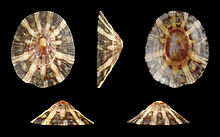Cellana radiata
Appearance
(Redirected from Cellana travancorica)
| Cellana radiata | |
|---|---|

| |
| Cellana radiata radiata | |
| Scientific classification | |
| Domain: | Eukaryota |
| Kingdom: | Animalia |
| Phylum: | Mollusca |
| Class: | Gastropoda |
| Subclass: | Patellogastropoda |
| Family: | Nacellidae |
| Genus: | Cellana |
| Species: | C. radiata
|
| Binomial name | |
| Cellana radiata (Born, 1778)
| |
| Synonyms[1][2] | |
| |
Cellana radiata (common name: the rayed wheel limpet), is a species of predatory sea snail, a marine gastropod mollusk in the family Nacellidae.[1]
Subspecies
[edit]- Cellana radiata capensis (Gmelin, 1791)
- Cellana radiata radiata (Born, 1778)
- Cellana radiata cylindrica Gmelin, 1791: synonym of Cellana cylindrica (Gmelin, 1791)
- Cellana radiata enneagona (L. A. Reeve, 1854) : synonym of Cellana enneagona (Reeve, 1854)
- Cellana radiata orientalis (H. A. Pilsbry, 1891) : synonym of Cellana radiata (Born, 1778)
Description
[edit]The height of the flattened shell varies between 13 mm and 45 mm. The apex is slightly out of the middle and is often worn out. The shell has numerous, rather flat, granular ridges of varying height. The color of the shell is grayish white to dark brown, with the ribs somewhat darker. The interior is pale white and iridescent. The markings of the muscles contrast with a dark gray color.
Distribution
[edit]This species is distributed in the Indo-Pacific, mainly Australia and can be found on rocks in littoral and sublittoral areas.[citation needed]
References
[edit]- ^ a b Cellana radiata (Born, 1778). WoRMS (2010). Cellana radiata (Born, 1778). In: Bouchet, P.; Gofas, S.; Rosenberg, G. (2010) World Marine Mollusca database. Accessed through: World Register of Marine Species at http://www.marinespecies.org/aphia.php?p=taxdetails&id=207651 on 31 October 2010 .
- ^ "Cellana radiata radiata". Gastropods.com. Retrieved 31 October 2010.
- Nakano T. & Ozawa T. (2007). Worldwide phylogeography of limpets of the order Patellogastropoda: molecular, morphological and paleontological evidence. Journal of Molluscan Studies 73(1): 79–99
External links
[edit]-
Cellana radiata capensis
-
Cellana radiata capensis, ventral view
-
Cellana radiata enneagona
-
Cellana radiata enneagona, ventral view




